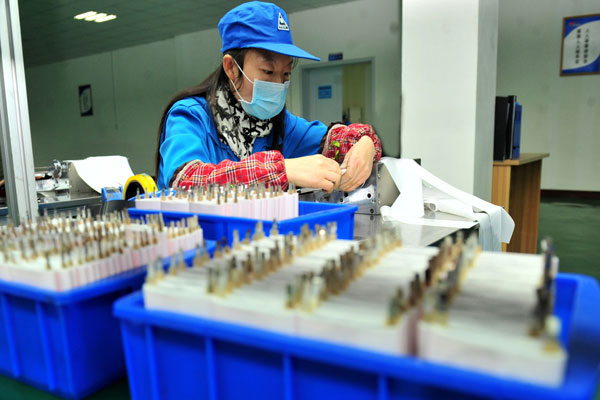China holds competitive edge as top manufacturer
Updated: 2013-01-23 00:01
By Zheng Yangpeng (China Daily)
|
||||||||
Despite rising labor costs and an aging population, China is still regarded as the top destination for manufacturing, and will retain this top spot over the next five years, according to an international survey released on Tuesday.
The survey, co-launched by Deloitte Touche Tohmatsu Ltd and the United States Council on Competitiveness, was based on interviews with more than 550 chief executive officers and senior leaders at manufacturing companies around the world.
 |
|
A worker assembles environmentally friendly lithium batteries at an industrial park in Yichang, Hubei province. A survey found that China retains fi rst place in terms of competitiveness in manufacturing, followed by Germany and the United States. [ZHANG GUORONG / FOR CHINA DAILY] |
Germany and the US came after China in terms of manufacturing competitiveness. But they will be replaced by India and Brazil over the next five years, according to the survey.
Ricky Tung, co-leader of the manufacturing industry group of Deloitte China, said the CEO ratings seem to suggest China is becoming more of a developed economy competitor than its emerging economy counterparts.
"In addition to supportive policies, China still has relatively lower labor costs and is above average in the attractiveness of its corporate tax rates. With its focused efforts to localize supply chains and create innovation hubs, China is also seen by CEOs as the only emerging economy offering the same supplier network advantages as developed economies."
But some Chinese experts and exporters are more pessimistic about the future of the nation's manufacturing sector, citing rising wages, an aging labor force and a rising exchange rate.
Zhou Shijian, a senior trade expert at Tsinghua University, said the top spot was an "overestimate".
He said that Chinese manufacturers are losing their competitive advantage.
"When I talked with a diplomat recently, he told me that Chinese products used to close in that of the Japan and South Korea. But now it is Southeast Asian nations' products closing in ours," Zhou said.











